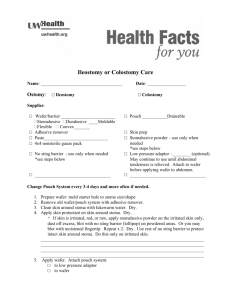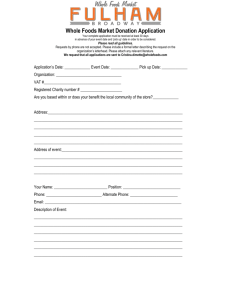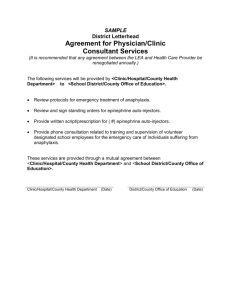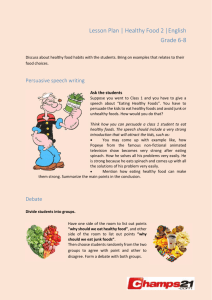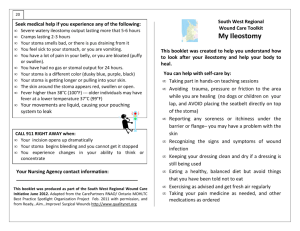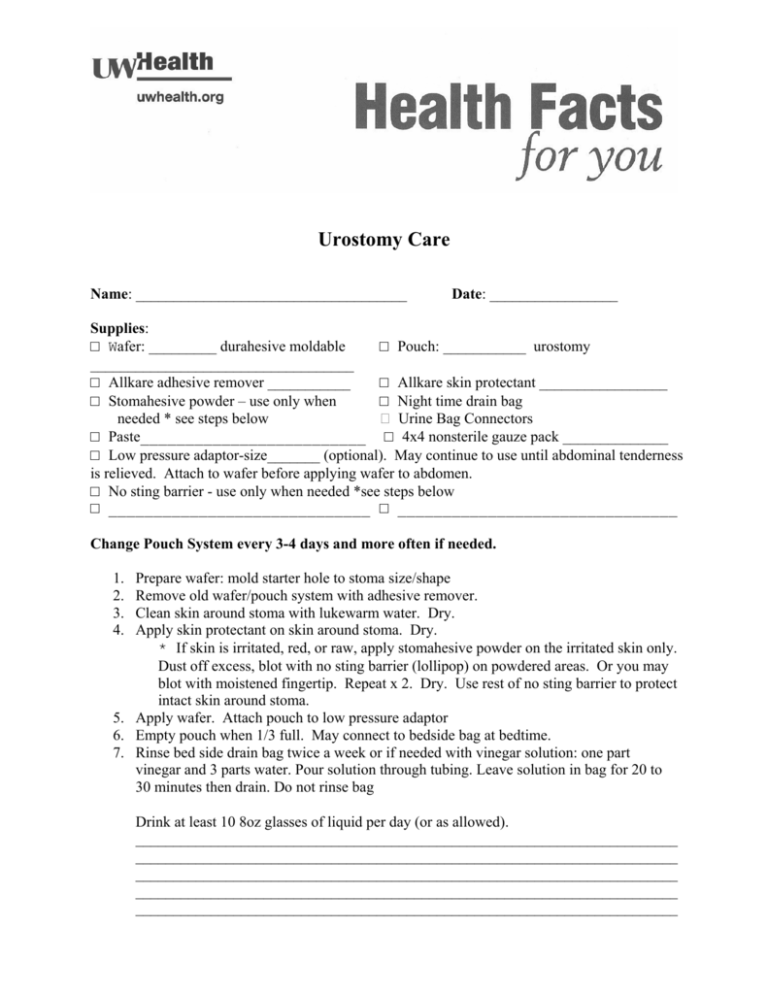
Urostomy Care
Name: ____________________________________
Date: _________________
Supplies:
□ Wafer: _________ durahesive moldable
□ Pouch: ___________ urostomy
___________________________________
□ Allkare adhesive remover ___________
□ Allkare skin protectant _________________
□ Stomahesive powder – use only when
□ Night time drain bag
needed * see steps below
Urine Bag Connectors
□ Paste_________________________ □ 4x4 nonsterile gauze pack ______________
□ Low pressure adaptor-size_______ (optional). May continue to use until abdominal tenderness
is relieved. Attach to wafer before applying wafer to abdomen.
□ No sting barrier - use only when needed *see steps below
□ _____________________________ □ _______________________________
Change Pouch System every 3-4 days and more often if needed.
1.
2.
3.
4.
Prepare wafer: mold starter hole to stoma size/shape
Remove old wafer/pouch system with adhesive remover.
Clean skin around stoma with lukewarm water. Dry.
Apply skin protectant on skin around stoma. Dry.
* If skin is irritated, red, or raw, apply stomahesive powder on the irritated skin only.
Dust off excess, blot with no sting barrier (lollipop) on powdered areas. Or you may
blot with moistened fingertip. Repeat x 2. Dry. Use rest of no sting barrier to protect
intact skin around stoma.
5. Apply wafer. Attach pouch to low pressure adaptor
6. Empty pouch when 1/3 full. May connect to bedside bag at bedtime.
7. Rinse bed side drain bag twice a week or if needed with vinegar solution: one part
vinegar and 3 parts water. Pour solution through tubing. Leave solution in bag for 20 to
30 minutes then drain. Do not rinse bag
Drink at least 10 8oz glasses of liquid per day (or as allowed).
________________________________________________________________________
________________________________________________________________________
________________________________________________________________________
________________________________________________________________________
________________________________________________________________________
Go to the nearest emergency room if stoma turns dark color (dusky
blue, grey, brown or black) or if bleeding from stoma.
For other concerns, questions or problems, call the Urology Clinic at 608- 263-4757 and ask to
speak to your Doctor’s Nurse.
Ostomy Nursing: 608-263-8084
Notes:
Discharge Ostomy Supplies
Ostomy supplies are usually covered by your insurance. If you have Medicare, it will pay 80%
of the cost. If you also have a supplemental insurance plan, it will cover the other 20%. It is best
to find out first from your supplemental insurance where you can get your ostomy prescription
filled. Many private insurance plans or HMOs will pay the full cost of the supplies as long as
they have been prescribed by a doctor. Your prescription will need to be renewed every 90 days
to keep having the cost of supplies covered. After 6 months, it can be renewed by your primary
care doctor.
We will provide you with a small number of supplies when you go home. If you have been set
up for home health visits at discharge and you have Medicare, they will provide you with
supplies while you’re followed by Home Health. Once you have been discharged from Home
Health, call the Urology Clinic at (608) 263-4757 and leave a message for your Doctor’s nurse
with the name of your preferred provider. We will fax or e-mail your prescription to them. They
may mail the supplies to you or you may need to pick them up. Your provider may set a regular
schedule to deliver your supplies. Others may want you to call when you need more. They will
need a copy of your prescription.
If you do not have Home Health or Medicare, you will be discharged home with enough supplies
until your first clinic visit. At that time, you will receive a prescription for more ostomy
supplies. We can fax or e-mail this to your provider, or you may take it with you.
Do not order too many supplies before your first clinic visit. Most stomas shrink. You will
likely need a new prescription with your new flange size at that clinic visit.
Diet Guidelines
Adequate nutrition is important to your well-being. The foods you choose to eat provide both
nourishment and pleasure. Food tolerances can vary from person to person.
General guidelines for healthy eating:
Eat meals regularly. You should eat three or more times a day. Small, frequent meals
may be better tolerated and produce less gas.
Chew your food thoroughly. Chewing well will help avoid a blockage.
Eat in moderation and slowly. Too much of any food can cause problems, so eat
moderate amounts and eat slowly to allow for proper chewing and digestion. If a new
food seems to give you problems, don’t eat it for a few weeks, but try it again later.
Drink plenty of fluids daily.
Above all, remember that no two people will react the same to foods. You will learn
through experience which foods, if any, you should avoid.
Reducing gas and odor
Gas is normal but if you feel you are having excess gas, you may try to change your diet to
eliminate the problem. Try these tips:
Eat regularly. Do not skip meals.
Avoid swallowing air while eating. Relax and eat slowly.
Avoid chewing gum or drinking through a straw.
Drink 10 glasses of water, cranberry juice, or other non-caffeinated beverages.
Foods that may cause gas or odor
Asparagus
Apples
Bananas
Beer
Broccoli
Brussels sprouts
Cabbage
Carbonated beverages
Cauliflower
Corn
Cucumber
Dairy products
Dried beans/peas
Eggs
Fatty foods
Grapes
Green pepper
Melons
Onions
Prunes
Radishes
Turnips
Beans
Mushrooms
Foods that may help prevent gas and odor
Yogurt with Active cultures
Buttermilk
Cranberry Juice
Parsley
Preventing Blockage
Certain foods, if eaten in large amounts and not chewed well, may cause blockage. Use caution
when eating these foods. Eat them in small amounts and be sure to chew them thoroughly.
Celery
Coleslaw
Corn, whole kernel
Dried fruits
Meat casings
Mushrooms
Nuts
Peas
Pineapple
Popcorn
Salad greens
Seeds
The consistency of your stools is determined to a certain extent by the location of your stoma in
your gastrointestinal (GI) tract. Normally, when the stoma is placed further up in the GI tract,
the stools tend to be looser. In some cases, a loose stool may be the result of eating certain
foods.
Foods that may cause loose stools
Alcoholic drinks
Apple juice
Baked beans
Tomatoes
Chocolate
Coffee
Dairy
Fried Foods
Grape Juice
Green leafy vegetables
Licorice
Prune juice
Spiced foods
Peanut butter (creamy)
Rice
Soda crackers
Tapioca
Weak tea
Foods that may help thicken stools
Applesauce
Bananas
Cheese
Cream of rice
Marshmallows
Mashed potatoes
Most importantly, remember to eat a healthy, well balanced diet and drink plenty of
fluids!!
If you have more questions please contact UW Health at one of the phone numbers listed below.
Nutrition Clinic
University Station
2880 University Avenue
Madison, WI 53705
(608) 263-5012
Nutrition Clinic
UW Health West Clinic
451 Junction Road
Madison, WI 53717
(608) 265-7526
Nutrition Clinic
UW Health East Clinic
5249 East Terrace Drive
Madison, WI 53718
(608) 265-0963
Copyright © 5/2013. University of Wisconsin Hospital and Clinics Authority. All rights reserved. Produced by the
Department of Nursing. HF#7433

